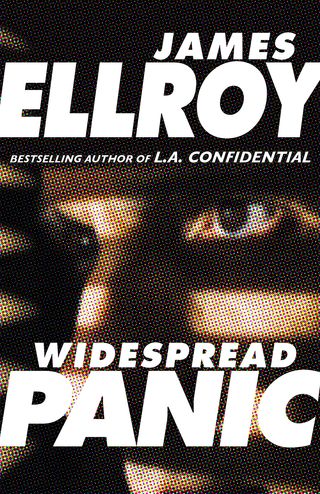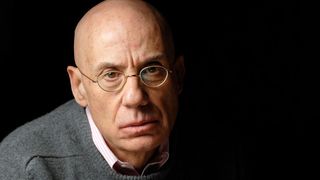Real cities have something else, some individual bony structure under the muck. Los Angeles has Hollywood – and hates it. It ought to consider itself damn lucky. Without Hollywood it would be a mail order city. Everything in the catalogue you could get better somewhere else. – Raymond Chandler, The Little Sister.
Except macabre murders, of course, splashed in lurid tabloid headlines.
James Ellroy, who delights in the sobriquet of the ‘Demon Dog’ of American crime writing, has returned to the Los Angeles of the mid-1950s with this latest offering of crime and corruption. This is LA a few years beyond the opening of the decade, as portrayed in his most underrated novel, The Big Nowhere. Ellroy’s central character is the real figure Fred Otash, former LAPD officer and current fixer for the powerful and privileged, whose methods were never taught, if perhaps contemplated, at the LA Police Academy. Otash deploys interrogation techniques which are highly reminiscent of Officer Bud White’s original use of a garbage disposal to persuade a reluctant thug to talk. Otash relies upon a restaurant deep fryer to achieve similar ends.
Creatively, Ellroy places Otash in purgatory where he is working his way through a long list of sins while being persecuted by some of his victims, including a young senator, Jack Kennedy. Otash is seeking redemption for a list of appalling transgressions which begins with the cold-blooded murder of a police suspect within shouting distance of LAPD headquarters. True, a senior officer instructed Otash to kill the villain while in custody; after all, the person concerned, Ralph Horvath, was thought to be a cop killer. The problem is, the cop survives and the villain is dispatched. This is the kind of ethical dilemma that has confronted Otash from earliest times and has seen him cross over the line and stay there.
James Ellroy, who delights in the sobriquet of the ‘Demon Dog’ of American crime writing, has returned to the Los Angeles of the mid-1950s with this latest offering of crime and corruption.
Central to Ellroy’s novel of murder and mayhem is the making of the film Rebel Without a Cause, by Nicholas Ray and starring Natalie Wood and James Dean. Otash first encounters Dean among the night-owl crowd while working security in a supermarket.
‘I watched. I peeped. I lost myself in the losers. A goofy ghost came and went with them. He was about 23. He slouched in windbreakers and wore cigarettes as props. He breezed through the aisle at 3am. He always looked ecstatic…. I made him for an actor living off of chump change…’.
Ellroy places Dean as close to Otash in a criminal milieu of bugging and blackmail, to reward the seedy and unscrupulous publisher of Confidential magazine, Robert Harrison, who has Otash on his payroll. It has often been suggested that Nicholas Ray was bedding the very young Natalie Wood in a suite at the Chateau Marmont, while making the movie. However, the criminal enterprises which Ellroy has originating among the cast and crew of Rebel Without a Cause seem far-fetched, even by his elastic standards.
Moreover, Ellroy has maintained the staccato language which first appeared in a forgotten novel called White Jazz, where sentences became exclamations, and the language was reduced to outbursts. Add to this the style of Confidential, which is to be alliterative in every line, and you have a novel that is intermittently entertaining in its narrative but equally verging on the absurd as we take the journey. The disjointed style notwithstanding, the language owes more than a little to the golf caddies in Ellroy’s first major novel, Brown’s Requiem. And Ellroy has never again created a character as convincing as ‘Crazy’ Lloyd Hopkins in Blood on the Moon. James Woods’ memorable performance in the movie Cop, based on the novel, would not have been possible without the compelling depth of Ellroy’s character.

Historical accuracy seems not to trouble Ellroy at all. Prominent people from 1950s America, from Liberace to Adlai Stevenson, wander through his pages distinguished only by the uniformity of their venality and dishonesty. Otash may have been a real person and indeed thoroughgoing in criminal intent, but it is difficult to believe that at one moment he is seducing Elizabeth Taylor and shortly thereafter acting as a vigilante for LA’s longest-serving and highly controversial Police Chief, William H. Parker.
Readers may be tempted to conclude that the author still has fantasies of Ms Taylor: I carried her into the bedroom. The hoist popped buttons off my shirt. They shot across the room. We laffed. I heard the radio a bungalow over… We got naked. We were built boss, stratosphere stacked, and hung homewrecker heavy. We were the boffo best of LA ‘53.
Ellroy treats Los Angeles as the perfect cesspool for any form of degradation. But he lacks Raymond Chandler’s sense of nuance and his appreciation of human weakness crystallising in foolish deeds which lead to disaster. This is not The Big Sleep. Nor is there a Detective Harry Bosch in this Hollywood, pursuing justice in Michael Connelly’s novels. Rather it is of the pattern recently confirmed in Ellroy’s This Storm which is set in wartime Los Angeles, replete with Mexican Nazis and Japanese submarines in coastal North American waters.
Ellroy’s novels always trade in the fantastic, particularly about the Los Angeles criminal milieu, in which he includes the corroded and corrosive LAPD.
Unfortunately however, sometimes the reality of real crime in the City of Lost Angels comes perilously close to Ellroy’s imagination. Consider the Rampart Division of the LAPD at the end of last century. Several officers were moonlighting on the payroll of Death Row Records, which caused them to be involved in all manner of crime, including drug trafficking, perjury, and suggestions of murder. Some 90 officers were eventually indicted and a federal judge appointed by consent to oversee the department’s ethical recovery.
Bobby Kennedy once observed, ‘Every society gets the kind of criminal it deserves. What is equally true is that every community gets the kind of law enforcement it insists on.’ Amen. Widespread Panic is far from being James Ellroy at his best, but the Demon Dog is still howling.
Widespread Panic
James Ellroy
Knopf Publishing Group, pp.336






